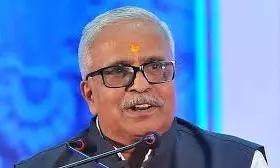Slut as in slattern
Slut as in slattern “Isn’t it strange Isn’t it rich That Panini The Grammarian of Sanskrit Is now an Italian sandwich ” From Hai Doonya! ;
Hai Doonya!
by
Bachchoo
The meanings of words slide. Single syllables, within the space of months, acquire new values. Gay doesn’t mean merry, “to google” is a respectable verb and tweet has passed from being comic birdsong to being idiots’ activity. Now a word whose meaning in the UK may or may not have shifted into dodgy territory — depending on whether you are an Islingtonian protector of public sentiment or a suburban golf-club bore — may impact the British general election result two years hence. Let me present the psephological maths: The 2010 election resulted in a hung Parliament with neither Labour nor Conservative having a clear majority and the Liberal-Democrats led by Nick Clegg having 50 seats and holding the balance of power. The horse trading resulted in the present Tory and Lib-Dem coalition. Mr Clegg and the governing clique of his party entered this arrangement with a “coalition agreement” which contended that the most important policy to follow was a reduction of the national debt which the previous Labour government of Gordon Brown had run up. Mr Clegg and the leadership of Lib-Dems have attempted throughout their term in coalition to persuade the country and their members that they are the rubber tyres on the Tory metal wheels — without them the ride would be rougher. Nevertheless, going along with the Tories has, according to several opinion polls, lost the Lib-Dems more than half their support in the country. Their left-wing voters have gone over to Labour or to resentful abstention of “plague-on-all-three-houses” nature. Since the 2010 election another distinct anti-coalition party has entered the fray and has been making some electoral headway. The United Kingdom Independence Party (Ukip) was founded in 1993 by Alan Sked, a London School of Economics lecturer who gathered a following on the single policy of unconditionally and precipitately quitting the European Union. The Ukip only gained attention and political momentum after 2010 when this policy of leaving the EU began to appeal to a majority of its members as a convenient hijab for xenophobia, anti-immigration and outright racism. Mr Sked, it must be noted, left the party he had founded. Ukip’s present leader, Nigel Farage, denies that the party is covertly racist. He is seen as a non-politician politician, photographed unself-consciously with a pint of beer in his hand and a broad smile. In the local elections of 2013, Ukip won some startling victories, taking their support from dissident Tories and, the pollsters calculated, from the working class supporters of Labour who respond to Ukip’s anti-EU and ban-all-immigration policies. Ukip now has nine out of 73 members in the European Parliament, and all of them are dedicated to taking the UK out of it. It has three members in the House of Lords and in the 2013 local elections it surprised the nation by polling more votes than the Lib-Dems, pushing them into fourth place. Until last week, this trend seemed to add up, in the boasts of Mr Farage and the fears of some Tories to a haemorrhage of Tory right-wing support to Ukip, putting the next general election into the pocket of the Labour Party. If the Labour Party gets even 35 per cent of the popular vote they will have a marginal majority in the House of Commons. With a few percentage points over or under this figure they may have to consider a coalition with the Liberal-Democrats who will, because they are not Ukip or the other parties, retain some support in the country and seats in the House. That was the calculation with which Ukip went into its annual conference in London last week, confident and even bragging that they may replace the Lib-Dems as the third party and hold the balance of power in the next Parliament. That would depend upon Ukip being able to attract some support from people who are for Britain’s withdrawal from the EU but not necessarily for the other wishful policies that the party espouses, such as reducing all taxes, lifting the ban on smoking in public, scrapping welfare and erecting a statue of Adolf Hitler in Hyde Park — please note I made that last one up. The image that they have sought to project is that they are non-politician politicians and can therefore speak their minds and truly represent the common man. One of their elected members of the European Parliament, Godfrey Bloom, took the particulars of this branding quite literally. Addressing a meeting of Ukip members in the course of their annual conference, he began to talk about housework and asked the women in the audience how many of them bothered to “clean behind the fridge”. Very few members, or perhaps none responded. None of them it seemed bothered to clean behind the fridge. “We’ve got a roomful of sluts then,” said Mr Bloom. His audience took it as he meant it and laughed. The remark was widely reported and decent opinion from all colours of the political spectrum reacted with shock and horror. Judging from the context, Mr Bloom meant the word “slut” in the sense of “slattern” and not with the connotation of sexual promiscuity or licentiousness that the word has acquired. Nevertheless, it was the biggest news to come out of poor Ukip’s conference, displacing any policy announcements that Mr Farage may have come up with and eclipsing the names of any other worthies of the party who, as far as the British public are concerned, may all be called Mr or Ms Anony Mouse. Mr Bloom was precipitately expelled as Ukip’s European man and has left one section of the nation wondering if it wants to vote for or join a party which speaks its mind in this particular way and another, tinier section determined to vote for people like Mr Bloom rather than Ed Miliband, David Cameron or anyone who is careful about how they address women, immigrants and, indeed, reality.




